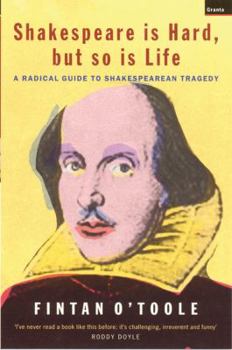Shakespeare Is Hard, But So Is Life: A Radical Guide to Shakespearean Tragedy
A unique and provocative guide to Shakespeare This description may be from another edition of this product.
Format:Paperback
Language:English
ISBN:186207528X
ISBN13:9781862075283
Release Date:September 2002
Publisher:Granta Books (Uk)
Length:164 Pages
Weight:0.32 lbs.
Dimensions:0.4" x 5.1" x 7.8"
Customer Reviews
2 ratings
You'll never view Shakespeare the same way again.
Published by Thriftbooks.com User , 16 years ago
Over the years, I've seen productions of all four of Shakespeare's major tragedies discussed in this book. With the exception of "Hamlet", I have always found these plays powerful and disturbing, without necessarily understanding why. I still don't get "Hamlet" - probably never will. But this relatively short book by Fintan O'Toole did actually offer fresh insights into where the power of these plays lies. In five clearly-written essays that are mercifully free of academic jargon, he analyzes the tragedies from a new point of view, which I found interesting and thought-provoking, without being completely persuasive. The book consists of five essays: Shakespeare is hard, but so is life. Hamlet: Dying as an art. Othello: Inside out. King Lear: Zero hour. Macbeth: Back to the future. In the first, central, essay O'Toole lays out his objections to the 'standard' mode of interpreting the tragedies, and proposes an alternative viewpoint. This is then illustrated by application to each of the four tragedies in turn. O'Toole opens with the assertion that we have all been sold a bill of goods were Shakespeare is concerned. The standard approach to interpreting the tragedies originated in Victorian England and is far more reflective of prevailing attitudes at that time than of the political and private realities that guided and influenced Shakespeare. To view the plays through this particular lens is to invite distortion. In particular, O'Toole calls out the following as being misguided: 1. The idea of the Tragic Flaw , which invites us to reduce the hero to a one-note character, and results in some 'witheringly useless' analyses (Macbeth is ambitious, Hamlet is indecisive, Lear is vain, Othello is jealous) 2. The idea of the Tragic Hero , which leads to an analysis in which the main character is viewed in isolation, rather than in terms of the interplay between characters. 3. The Victorian idea that the soliloquy is the 'heart of the tragedy', the place where the hero bares his true soul, and is thus the key to understanding the play. Combining 1 and 2 leads to a view of the tragedy as a play in which the potentially noble hero, through some flaw in his character, helps to bring his own downfall, and by suffering, acquires self-knowledge, and so purges his own faults. As O'Toole points out, the problem with this notion, which is taken directly from Aristotle with no regard to the enormous differences between Greek tragic heroes and Shakespearean ones, is that Shakespeare's plays make no consistent sense when viewed in this way. It is reductionist in a way that ultimately makes the protagonists seem one-dimensional, not very bright, and not very interesting. Idea #3 is a Victorian distortion of how soliloquies actually worked in the Shakespearean theater. How does O'Toole suggest we approach the plays, if not through the Victorian reformulation of Aristotle's lens? To get the full story, you'll have to read the essays yourself, but the following ob
Breathing fresh life into Shakespeare
Published by Thriftbooks.com User , 21 years ago
Although this is a reprint of his 1990 volume originally titled "No More Heroes," O'Toole's introduction to Shakespeare and his great tragedies is yet one of the most helpful retakes on why we need to return to the original plots (in both senses) of the author. O'Toole arms teachers, individual readers, and potential directors with insights that will restore excitement to the experience of Shakespeare.O'Toole is obviously as enthusiastic about his subject as Harold Bloom is, but his writing is careful, witty, and well thought out, with specific examples to back up his "radical" guide. Even the beginning Shakespearean will easily follow O'Toole's important placement of The Plays within their Elizabethan context: a turbulent time of social upheaval and personal insecurity (easy to appreciate early in this 21st Century). More experienced readers and teachers will (hopefully) enjoy being challenged to expand the narrow boxes in which recent generations have attempted to capture Hamlet, Macbeth, Othello, and Lear. The "tragic hero" and his "tragic flaw" (for example) are seen to be unnecessary distortions imposed by Victorian lenses. "See farther" - as Shakespeare might say. You may want to quibble with some of the author's interpretations, but you'll come away respecting O'Toole's honesty and clarity, and will no doubt savor new insights into many details of the play (it was not just for show that toads, nails, and witches are included in the dramas). Both little details and long-disected classic overarching issues (e.g., "Why did Hamlet delay?") come into brighter light. Warning to teachers: O'Toole will incite your students to think outside the boxes that have usually facilitated pat answers to essay asignments. Eminently readable and engaging.





